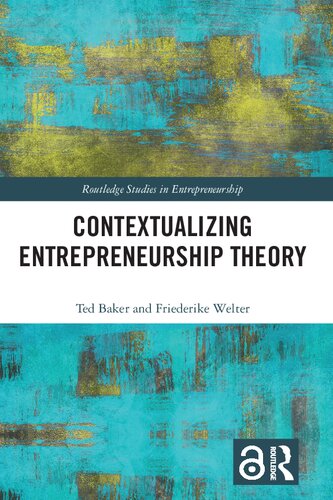

Most ebook files are in PDF format, so you can easily read them using various software such as Foxit Reader or directly on the Google Chrome browser.
Some ebook files are released by publishers in other formats such as .awz, .mobi, .epub, .fb2, etc. You may need to install specific software to read these formats on mobile/PC, such as Calibre.
Please read the tutorial at this link: https://ebookbell.com/faq
We offer FREE conversion to the popular formats you request; however, this may take some time. Therefore, right after payment, please email us, and we will try to provide the service as quickly as possible.
For some exceptional file formats or broken links (if any), please refrain from opening any disputes. Instead, email us first, and we will try to assist within a maximum of 6 hours.
EbookBell Team

4.8
24 reviewsAs the breadth and empirical diversity of entrepreneurship research have increased rapidly during the last decade, the quest to find a "one-size-fits-all" general theory of entrepreneurship has given way to a growing appreciation for the importance of contexts. This promises to improve both the practical relevance and the theoretical rigor of research in this field. Entrepreneurship means different things to different people at different times and in different places and both its causes and its consequences likewise vary. For example, for some people entrepreneurship can be a glorious path to emancipation, while for others it can represent the yoke tethering them to the burdens of overwork and drudgery. For some communities it can drive renaissance and vibrancy while for others it allows only bare survival. In this book, we assess and attempt to push forward contemporary conceptualizations of contexts that matter for entrepreneurship, pointing in particular to opportunities generating new insights by attending to contexts in novel or underexplored ways.
This book shows that the ongoing contextualization of entrepreneurship research should not simply generate a proliferation of unique theories – one for every context – but can instead result in better theory construction, testing and understanding of boundary conditions, thereby leading us to richer and more profound understanding of entrepreneurship across its many forms.
Contextualizing Entrepreneurship Theory will critically review the current debate and existing literature on contexts and entrepreneurship and use this to synthesize new theoretical and methodological frameworks that point to important directions for future research.